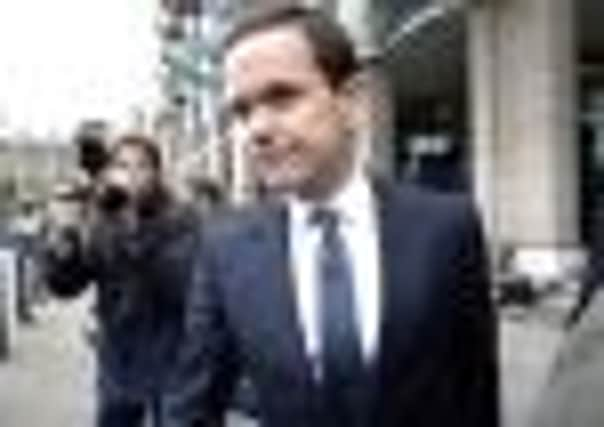Ex-bank director: ‘Bob Diamond told me to fix Libor rate’


Giving evidence to the Treasury select committee in the Commons, Andrew Bailey, head of the Prudential Business Unit at the Financial Services Authority (FSA), also claimed that “the tone was set at the top” by Mr Diamond, who resigned as chief executive earlier this month.
MPs on the committee yesterday focused on the chain of events that led to the Libor rate being lowered by Barclays in 2008 and the investigations that took place afterwards.
Advertisement
Hide AdAdvertisement
Hide AdThe London Interbank Offered Rate (Libor) is the rate at which banks lend to each other.
Yesterday’s evidence at the committee once again put Mr Diamond in the spotlight.
Mr del Missier was dragged into the affair when it was alleged he had “misinterpreted” a conversation between Mr Diamond and Bank of England deputy governor Paul Tucker as an instruction to lower Libor submissions, amid fears over Barclays’ financial health.
The Canadian banker, who resigned two weeks ago at the same time as Mr Diamond quit, said he “fully expected” staff to take into account the views raised by the Bank of England that the rates were too high.
However, Mr del Missier told MPs he only spoke to the head of the money market desk and did not follow up to check what effect his instruction had on Libor submissions.
In his evidence, he insisted that he had acted on the basis of a phone call with Mr Diamond.
“I took the action on the basis of the phone call that I had had with Mr Diamond,” Mr del Missier said.
“He [Bob Diamond] said that he had a conversation with Mr Tucker that the Bank of England was getting pressure from Whitehall around Barclays, the health of Barclays as a result of Libor rates, and that we should get our Libor rates down and that we should not be outliers.”
Advertisement
Hide AdAdvertisement
Hide AdMr del Missier added: “At the time, it did not seem an inappropriate action, given that this was coming from the Bank of England.”
Asked whether it was an instruction from Mr Diamond to him to lower Libor, Mr del Missier replied: “Yes, it was”.
He added: “I passed the instruction on to the head of the money market desk. I relayed the content of the conversation I had with Mr Diamond and fully expected the Bank of England views would be fully incorporated in the Libor submission.”
When asked if he was the “fall guy” for Mr Diamond, he replied: “I don’t think I’m acting as a fall guy. I’ve resigned my position with the bank, for the good of the bank. I’m not the fall guy for anything.”
He also told the committee that, while he and Mr Diamond were “professional friends”, they did not socialise very often.
Mr Diamond had told the committee at a previous hearing that Mr del Missier had misunderstood him and the memo he received from Mr Tucker.
In a later hearing, Mr Tucker also said he was merely raising concerns over the rate, and neither the Bank nor the government had told Barclays to give a false inpression of its financial health to avoid having to bail out another bank.
However, he did admit that there was a fear at the time that “Barclays was next”.
Advertisement
Hide AdAdvertisement
Hide AdBut the committee also heard yesterday that the FSA had found the culture of Barclays to be worse than other banks’.
Mr Bailey said there “was a problem with the institution and that came from the tone at the top”.
FSA executive chairman Lord Turner also told the committe he had written to Barclays in April 2012 complaining that the bank had “a tendency continually to seek advantage from complex structures or favourable regulatory interpretations”.
Lord Turner denied the FSA was, as one MP put it, “asleep at the wheel”.
But he claimed that the FSA was understaffed to deal with all the problems going on in 2008.
He said: “Part of the story of the FSA at that time is that we did have – we never used the word – a somewhat light-touch regulation in particular in those areas of wholesale conduct.
“We were only to a small extent focused on the activities of investment banks. We only had about five people on Barclays and five people on Royal Bank of Scotland. ”
Lord Turner said Libor setting was not a formally regulated process, although it “could have been supervised”.
IN HIS OWN WORDS
Advertisement
Hide AdAdvertisement
Hide Ad“I took the action on the basis of the phone call that I had had with Mr Diamond.”
“At the time it did not seem an inappropriate action, given that this was coming from the Bank of England.”
“He [Bob Diamond] said that he had a conversation with Mr Tucker of the Bank of England, that the Bank of England was getting pressure from Whitehall around Barclays, the health of Barclays as a result of Libor rates, and that we should get our Libor rates down and that we should not be outliers.”
“I passed the instruction on to the head of the money market desk.”
“I relayed the content of the conversation I had with Mr Diamond and fully expected the Bank of England views would be fully incorporated in the Libor submission.”